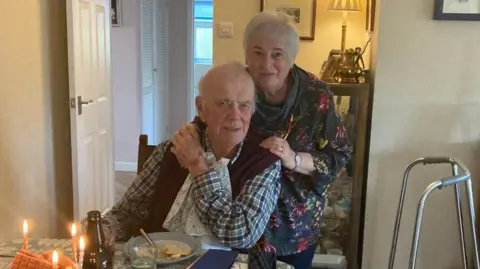People 'dying in pain due to end-of-life care gaps'
 Eiry Miles
Eiry MilesPeople are living their final days "isolated, in pain and struggling to make ends meet" due to gaps in end-of-life care, a leading charity has said.
Marie Curie said one in five hospital beds in Wales were occupied by people in the last year of their lives and "bold, radical" action was needed for services which were at "breaking point".
One family said they had to fight to ensure their 85-year-old father could die peacefully at home rather than in a hospital ward.
The Welsh government said it provided more than £16m a year to ensure people had access to the best possible end-of-life care.
While the charity said a hospital setting was the best possible place for many palliative care patients, many want to spend their final days at home or in the community.
Gareth Miles, 85, spent 10 weeks on a ward his family felt did not meet the needs of an older man living with Parkinson's disease.
His daughter Eiry Miles said: "There were very lovely staff working on the ward, they were very kind to us, but he [Mr Miles] was in the wrong place.
"When we realised that dad's life was coming to an end, we wanted conversations with him, quiet conversations. We wanted to express our feelings, express our love for him."
Despite a "great" social worker also recognising home was the best place for Mr Miles, the family said a lack of carers in the community meant he was unable to return.
 Eiry Miles
Eiry Miles"This situation clearly shows that there are not enough carers, that the profession is not funded sufficiently," added Ms Miles.
With the help of Marie Curie , Mr Miles eventually returned to his family home in Carmarthenshire, which his family described as "priceless".
Ms Miles added: "When dad came home there was a change in him straight away, a peaceful feeling.
"When he laid on the bed at home, he just said 'oh, dyma braf' - 'this is nice' in Welsh - because it was just quiet and peaceful, there was birdsong outside and people he knew around him."
Mr Miles died four days later in his home, exactly where he wanted to be.
Marie Curie said gaps in care meant "too many people are spending their final days isolated, in pain, and struggling to make ends meet".
"End-of-life care in Wales is at breaking point," said Senior Policy Manager Natasha Davies.
"Services and staff are struggling to deliver the care people need, when and where they need it. There is an urgent need for change."
The charity recognised while hospital was the best place for many palliative care patients, better community and out-of-hours care would allow people to be cared for in their homes.
"It also means having meaningful conversations with dying people about their care preferences, so their wishes are heard and respected," added Ms Davies.
The Welsh government said good palliative and end-of-life care could make a "huge difference" to helping people die with dignity.
It said it provided more than £16m a year to make sure people had access to the best possible end-of-life care, including setting national standards and boosting community services.
